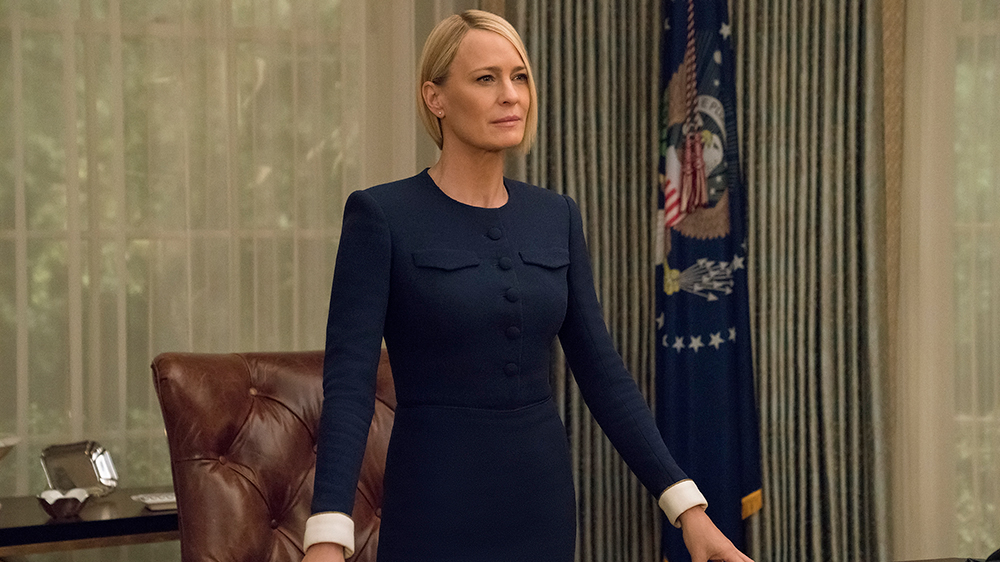TV Review: ‘House of Cards’ Season 6
By Daniel D’Addario
LOS ANGELES (Variety.com) – A
series that was built around the chemistry between two actors — and that had been building toward a climactic showdown — is suddenly a solo act. And while the sixth and final season of “House of Cards” is as mixed a bag as the thrilling but uneven Netflix drama has yet produced, the good news is that Robin Wright is up to the task of anchoring the show.
After all, since the earliest episodes, Wright has been the not-so-secret weapon of “,” playing a character whose astringent refusal to yield to emotion balanced the more ornate performance of Kevin Spacey as her ambitious but weaker-willed husband. It was a well-tuned duet in which she did all the calibration, constructing a careful performance around his Shakespearean floridity.
With Spacey now fired from the show due to allegations of past sexual misconduct, Wright is on her own. And the spotlight suits her. Serving as president, her Claire Underwood practically relishes her personal unpopularity both among the American public and in an administration devoid of allies; that no one respects her outside the White House or trusts her inside it gives her room to make massive swings without concerning herself with likability. The clever thing “House of Cards” does early in its sixth season is not to cover for Frank Underwood’s absence but to use it to emphasize the fundamental isolation in Claire’s character, the chilly desire to alienate others so that, human contact having been taken out of the equation, things can get accomplished.
All of these are notes Wright has played before, but perpetually in reaction to Spacey. Indeed, we gain new insights into Claire from Wright’s work this season, so much so that occasional flashbacks and heavy-handed insertions of backstory feel unnecessary in light of Wright telling us more with a glance. While it’s not the endgame that was planned, seeing her have the space to give a performance whose crystalline quality isn’t swamped by the vastly more over-the-top Spacey — including getting to deliver the trademark monologues to camera — is a thrill for long-suffering fans of the franchise.
But “House of Cards” has always preferred situation to character. (Spacey’s performance was so huge in part in order to stand up to a plot that could flatten subtler work.) And soon enough, crises strike, especially the meddling of Annette and Bill Shepherd (Diane Lane and Greg Kinnear), a pair of archconservative siblings meant to evoke the Koch brothers if their line to the president were even more direct and complicated by personal history. They emerge as characters we’d never met, but claim they’re owed a debt by Frank, one that Claire is forced to pay. Even as the solo lead of the show, Claire is still struggling to break through. Even as Frank Underwood is gone — dead, with no small amount of ambiguity around how and where he died — he hangs over the story, with old plotlines (some reaching back across seasons and testing fans’ memory) and new ones referring endlessly to the late president.
Obviously, Frank’s death is a big deal in this universe. But it feels at times like the series, scrambling to come up with a plot for a final season without its first-billed lead, never quite escapes his gravitational pull. The show, one that’s wildly changed narrative course many times even without pragmatic real-world reasons at stake, seems surprisingly confused about how to reboot. “House of Cards” didn’t need to scorn its own history in order to create a satisfying conclusion, but fans have a right to expect it to be fleeter-footed in giving them a tale worth caring about post-Frank, which would have called for meaningfully moving past him. In the moments when Claire is allowed not just the camera but the story, “House of Cards” is a ride; when the past is relitigated and the specter of Frank rears up once more, it feels like that worst thing a binge-able drama can be: a trudge. This drama, on which we’ve learned anything can happen, should be far less bound to its own past.
Drama: (Eight episodes, five screened for review); Fri., Nov. 2
Running Time: 60 MIN.
Executive Producers:
Melissa James Gibson, Frank Pugliese, , David Fincher, Joshua Donen, Dana Brunetti, Eric Roth, Michael Dobbs, Andrew Davies.
Cast: Robin Wright, Michael Kelly, Diane Lane, Greg Kinnear, Campbell Scott, Patricia Clarkson, Jayne Atkinson, Derek Cecil, Cody Fern, Boris McGiver, Constance Zimmer

